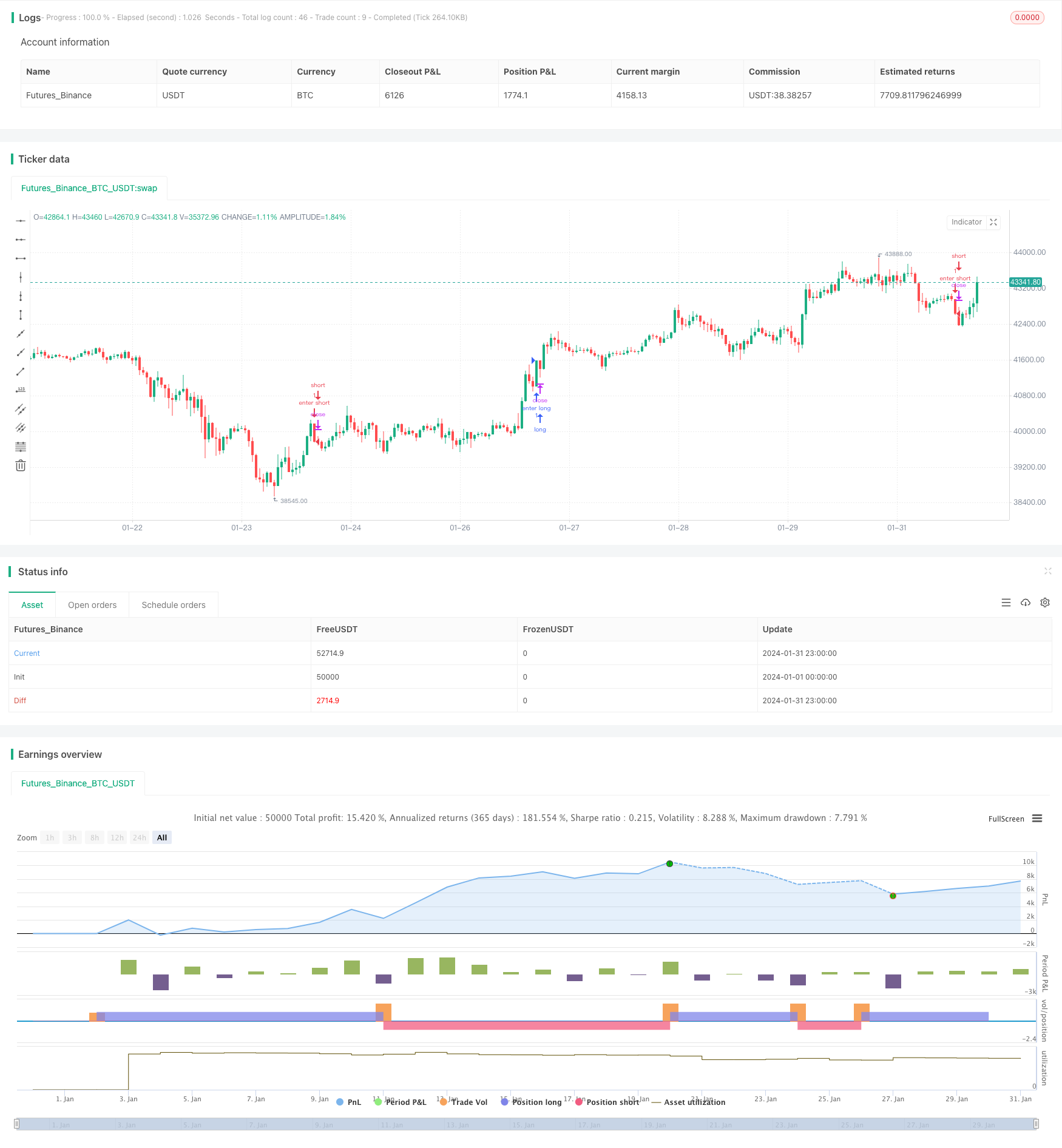
概述
本策略基于K线的开高低数据设计 Entries,以寻找趋势的反转点。 Entries后会根据ATR指标设定止损线,并追踪止损。策略还会根据风险回报比例计算Target位,在达到Target或被止损后平仓。
策略原理
该策略的 Entries 信号来自开高低点。当某根K线的开盘价等于最低价时产生买入信号,当开盘价等于最高价时产生卖出信号,表示可能存在趋势反转机会。
Entries后会根据ATR指标计算动态追踪止损。买入后止损线为最近N根K线内的最低价减去1倍ATR;卖出后止损线为最近N根K线内的最高价加上1倍ATR。止损线会动态更新,追踪价格运行。
目标利润按照设置的风险回报比率计算。买入的目标价为Entry价格加上(Entry价格与止损价差额的风险回报比倍数);卖出目标价为Entry价格减去(止损价与Entry价差额的风险回报比倍数)。
当价格触及止损价或目标价时,发出平仓指令。
优势分析
该策略具有以下优势:
Entries信号简单清晰,容易判断,避免多次震荡。
动态ATR止损,最大程度锁定盈利,避免追高杀低。
风险回报率控制,避免利润遗留和超短线操作。
适用于不同品种,容易优化。
风险分析
该策略也存在一定的风险:
Entries信号可能存在一定程度的滞后,错过行情最佳点位。
止损价靠近或者过于宽松,可能被套或失去盈利。
无趋势判断模块,在震荡行情中容易被套。
无法处理隔夜建仓的情况。
对应优化方向: 1. 结合其他指标判断趋势,避免震荡行情的套利。
- 调整ATR参数或加入波动率控制,优化止损线位。
3.增加趋势判断或过滤模块,减少Entries信号的误差。
- 加入隔夜处理模块,处理特定品种的隔夜仓位。
总结
本策略总体来说较为简单直接,Entries信号清晰,止损思路合理,风险控制到位。但也存在一定Limitation,如趋势判断不足,信号滞后等问题。这些问题也为未来的优化提供了方向。通过结合更多指标判断和风控模块,该策略可以进一步增强效果,变得更加通用。
/*backtest
start: 2024-01-01 00:00:00
end: 2024-01-31 23:59:59
period: 1h
basePeriod: 15m
exchanges: [{"eid":"Futures_Binance","currency":"BTC_USDT"}]
*/
//@version=5
// Open-High-Low strategy
strategy('Strategy: OLH', shorttitle="OLH", overlay=true )
// Inputs
slAtrLen = input.int(defval=14, title="ATR Period for placing SL", group="StopLoss settings")
showSLLines = input.bool(defval=false, title="Show SL lines in chart", tooltip="Show SL lines also as dotted lines in chart. Note: chart may look untidy.", group="Stolploss settings")
// Trade related
rrRatio = input.float(title='Risk:Reward', step=0.1, defval=2.0, group="Trade settings")
endOfDay = input.int(defval=1500, title="Close all trades, default is 3:00 PM, 1500 hours (integer)", group="Trade settings")
mktAlwaysOn = input.bool(defval=true, title="Markets that never closed (Crypto, Forex, Commodity)", tooltip="Some markers never closes. For those cases, make this checked.", group="Trade settings")
lotSize = input.int(title='Lot Size', step=1, defval=1, group="Trade settings")
// Utils
green(open, close) => close > open ? true : false
red(open, close) => close < open ? true : false
body(open, close) => math.abs(open - close)
lowerwick = green(open, close) ? open - low : close - low
upperwick = green(open, close) ? high - close : high - open
crange = high - low
crangep = high[1] - low[1] // previous candle's candle-range
bullish = close > open ? true : false
bearish = close < open ? true : false
// Trade signals
longCond = barstate.isconfirmed and (open == low)
shortCond = barstate.isconfirmed and (open == high)
// For SL calculation
atr = ta.atr(slAtrLen)
highestHigh = ta.highest(high, 7)
lowestLow = ta.lowest(low, 7)
longStop = showSLLines ? lowestLow - (atr * 1) : na
shortStop = showSLLines ? highestHigh + (atr * 1) : na
plot(longStop, title="Buy SL", color=color.green, style=plot.style_cross)
plot(shortStop, title="Sell SL", color=color.red, style=plot.style_cross)
// Trade execute
h = hour(time('1'), syminfo.timezone)
m = minute(time('1'), syminfo.timezone)
hourVal = h * 100 + m
totalTrades = strategy.opentrades + strategy.closedtrades
if (mktAlwaysOn or (hourVal < endOfDay))
// Entry
var float sl = na
var float target = na
if (longCond)
strategy.entry("enter long", strategy.long, lotSize, limit=na, stop=na, comment="Enter Long")
sl := longStop
target := close + ((close - longStop) * rrRatio)
alert('Buy:' + syminfo.ticker + ' ,SL:' + str.tostring(math.floor(sl)) + ', Target:' + str.tostring(target), alert.freq_once_per_bar)
if (shortCond)
strategy.entry("enter short", strategy.short, lotSize, limit=na, stop=na, comment="Enter Short")
sl := shortStop
target := close - ((shortStop - close) * rrRatio)
alert('Sell:' + syminfo.ticker + ' ,SL:' + str.tostring(math.floor(sl)) + ', Target:' + str.tostring(target), alert.freq_once_per_bar)
// Exit: target or SL
if ((close >= target) or (close <= sl))
strategy.close("enter long", comment=close < sl ? "Long SL hit" : "Long target hit")
if ((close <= target) or (close >= sl))
strategy.close("enter short", comment=close > sl ? "Short SL hit" : "Short target hit")
else if (not mktAlwaysOn)
// Close all open position at the end if Day
strategy.close_all(comment = "Close all entries at end of day.")